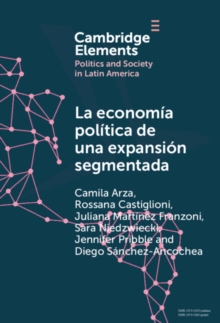
The Political Economy of Segmented Expansion : Latin American Social Policy in the 2000s PDF
by Camila (CONICET and Centro Interdisciplinario para el Estudio de Politicas Publicas (CIEPP)) Arza, Rossana (Diego Portales University, Chile) Castiglioni, Juliana (Universidad Nacional, Costa Rica) Martinez Franzoni, Sara (University of California, Santa Cruz) Niedzwiecki, Jennifer (University of Richmond) Pribble, Diego (University of Oxford) Sanchez-Ancochea
Part of the Elements in Politics and Society in Latin America series
Description
The early 2000s were a period of social policy expansion in Latin America.
New programs were created in healthcare, pensions, and social assistance, and previously excluded groups were incorporated into existing policies.
What was the character of this social policy expansion?
Why did the region experience this transformation? Drawing on a large body of research, this Element shows that the social policy gains in the early 2000s remained segmented, exhibiting differences in access and benefit levels, gaps in service quality, and unevenness across policy sectors.
It argues that this segmented expansion resulted from a combination of short and long-term characteristics of democracy, favorable economic conditions, and policy legacies.
The analysis reveals that scholars of Latin American social policy have generated important new concepts and theories that advance our understanding of perennial questions of welfare state development and change.
Information
-
Download - Immediately Available
- Format:PDF
- Pages:Worked examples or Exercises
- Publisher:Cambridge University Press
- Publication Date:23/11/2022
- Category:
- ISBN:9781009344104
Information
-
Download - Immediately Available
- Format:PDF
- Pages:Worked examples or Exercises
- Publisher:Cambridge University Press
- Publication Date:23/11/2022
- Category:
- ISBN:9781009344104










